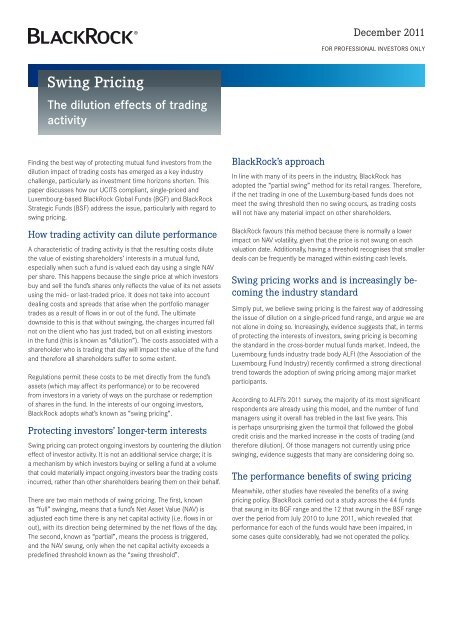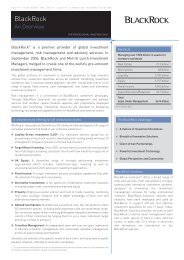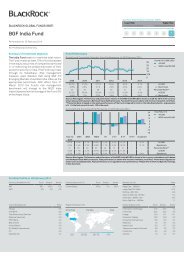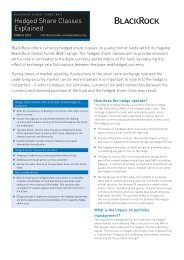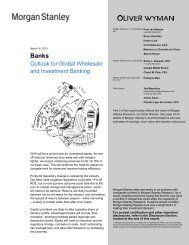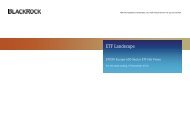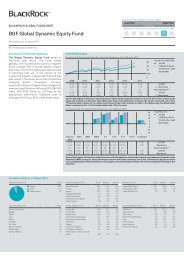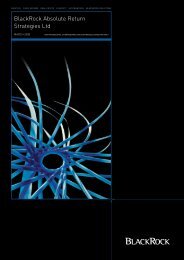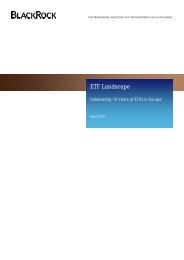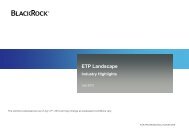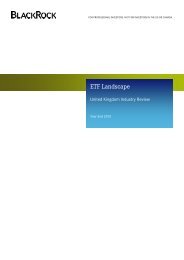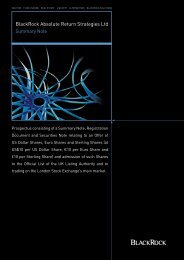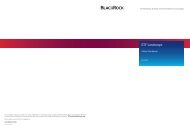Swing Pricing - BlackRock International
Swing Pricing - BlackRock International
Swing Pricing - BlackRock International
- No tags were found...
Create successful ePaper yourself
Turn your PDF publications into a flip-book with our unique Google optimized e-Paper software.
December 2011<br />
FOR PROFESSIONAL INVESTORS ONLY<br />
<strong>Swing</strong> <strong>Pricing</strong><br />
The dilution effects of trading<br />
activity<br />
Finding the best way of protecting mutual fund investors from the<br />
dilution impact of trading costs has emerged as a key industry<br />
challenge, particularly as investment time horizons shorten. This<br />
paper discusses how our UCITS compliant, single-priced and<br />
Luxembourg-based <strong>BlackRock</strong> Global Funds (BGF) and <strong>BlackRock</strong><br />
Strategic Funds (BSF) address the issue, particularly with regard to<br />
swing pricing.<br />
How trading activity can dilute performance<br />
A characteristic of trading activity is that the resulting costs dilute<br />
the value of existing shareholders’ interests in a mutual fund,<br />
especially when such a fund is valued each day using a single NAV<br />
per share. This happens because the single price at which investors<br />
buy and sell the fund’s shares only reflects the value of its net assets<br />
using the mid– or last-traded price. It does not take into account<br />
dealing costs and spreads that arise when the portfolio manager<br />
trades as a result of flows in or out of the fund. The ultimate<br />
downside to this is that without swinging, the charges incurred fall<br />
not on the client who has just traded, but on all existing investors<br />
in the fund (this is known as “dilution”). The costs associated with a<br />
shareholder who is trading that day will impact the value of the fund<br />
and therefore all shareholders suffer to some extent.<br />
Regulations permit these costs to be met directly from the fund’s<br />
assets (which may affect its performance) or to be recovered<br />
from investors in a variety of ways on the purchase or redemption<br />
of shares in the fund. In the interests of our ongoing investors,<br />
<strong>BlackRock</strong> adopts what’s known as “swing pricing”.<br />
Protecting investors’ longer-term interests<br />
<strong>Swing</strong> pricing can protect ongoing investors by countering the dilution<br />
effect of investor activity. It is not an additional service charge; it is<br />
a mechanism by which investors buying or selling a fund at a volume<br />
that could materially impact ongoing investors bear the trading costs<br />
incurred, rather than other shareholders bearing them on their behalf.<br />
There are two main methods of swing pricing. The first, known<br />
as “full” swinging, means that a fund’s Net Asset Value (NAV) is<br />
adjusted each time there is any net capital activity (i.e. flows in or<br />
out), with its direction being determined by the net flows of the day.<br />
The second, known as “partial”, means the process is triggered,<br />
and the NAV swung, only when the net capital activity exceeds a<br />
predefined threshold known as the “swing threshold”.<br />
<strong>BlackRock</strong>’s approach<br />
In line with many of its peers in the industry, <strong>BlackRock</strong> has<br />
adopted the “partial swing” method for its retail ranges. Therefore,<br />
if the net trading in one of the Luxemburg-based funds does not<br />
meet the swing threshold then no swing occurs, as trading costs<br />
will not have any material impact on other shareholders.<br />
<strong>BlackRock</strong> favours this method because there is normally a lower<br />
impact on NAV volatility, given that the price is not swung on each<br />
valuation date. Additionally, having a threshold recognises that smaller<br />
deals can be frequently be managed within existing cash levels.<br />
<strong>Swing</strong> pricing works and is increasingly becoming<br />
the industry standard<br />
Simply put, we believe swing pricing is the fairest way of addressing<br />
the issue of dilution on a single-priced fund range, and argue we are<br />
not alone in doing so. Increasingly, evidence suggests that, in terms<br />
of protecting the interests of investors, swing pricing is becoming<br />
the standard in the cross-border mutual funds market. Indeed, the<br />
Luxembourg funds industry trade body ALFI (the Association of the<br />
Luxembourg Fund Industry) recently confirmed a strong directional<br />
trend towards the adoption of swing pricing among major market<br />
participants.<br />
According to ALFI’s 2011 survey, the majority of its most significant<br />
respondents are already using this model, and the number of fund<br />
managers using it overall has trebled in the last five years. This<br />
is perhaps unsurprising given the turmoil that followed the global<br />
credit crisis and the marked increase in the costs of trading (and<br />
therefore dilution). Of those managers not currently using price<br />
swinging, evidence suggests that many are considering doing so.<br />
The performance benefits of swing pricing<br />
Meanwhile, other studies have revealed the benefits of a swing<br />
pricing policy. <strong>BlackRock</strong> carried out a study across the 44 funds<br />
that swung in its BGF range and the 12 that swung in the BSF range<br />
over the period from July 2010 to June 2011, which revealed that<br />
performance for each of the funds would have been impaired, in<br />
some cases quite considerably, had we not operated the policy.
The results below highlight the most significant performance impacts across the BGF range<br />
Number of<br />
<strong>Swing</strong>s during<br />
the period<br />
Base ccy<br />
price at<br />
beginning<br />
of period<br />
Base ccy<br />
price<br />
30 June 2011<br />
Class Base<br />
Performance<br />
Performance<br />
without<br />
<strong>Swing</strong>ing<br />
Performance<br />
benefit<br />
BGF Asian Tiger Bond Fund 72 27.25 29.19 7.11% 4.59% 2.52%<br />
BGF Global High Yield Bond Fund 60 14.59 16.79 14.24% 12.11% 2.13%<br />
BGF US Dollar High Yield Bond Fund 42 19.69 22.64 14.94% 14.25% 0.69%<br />
BGF World Technology Fund 12 10.39 13.33 28.34% 27.89% 0.45%<br />
BGF Emerging Markets Bond Fund 32 11.67 12.88 10.38% 9.97% 0.41%<br />
BGF China Fund 42 11.19 12.69 13.35% 12.95% 0.40%<br />
The study on the BSF range found similarly compelling results. We again highlight the most significant<br />
Number of<br />
<strong>Swing</strong>s during<br />
the period<br />
Base ccy<br />
price at<br />
beginning<br />
of period<br />
Base ccy<br />
price<br />
30 June 2011<br />
Class Base<br />
Performance<br />
Performance<br />
without<br />
<strong>Swing</strong>ing<br />
Performance<br />
benefit<br />
BSF Latin American Opportunities Fund 20 112.95 149.9 32.71% 30.48% 2.24%<br />
BSF European Opportunities Absolute Return Fund 10 100 101.4 1.40% 0.65% 0.75%<br />
BSF Fixed Income Strategies Fund 14 100.78 103.35 2.55% 2.06% 0.49%<br />
BSF European Diversified Equity Absolute Return Fund 28 101.82 112.4 10.39% 9.95% 0.44%<br />
BSF European Opportunities Extension Strategies Fund 6 88.11 104.88 19.03% 18.62% 0.41%<br />
BSF European Credit Strategies Fund 7 118.81 113.64 -4.35% -4.73% 0.38%<br />
Source: <strong>BlackRock</strong>, August and November 2011.<br />
The funds’ performance would have been diluted (reduced) by<br />
the amounts shown in the final column had we not protected it<br />
by using price swinging.<br />
Investors that trade at a swung price are effectively paying the dealing<br />
costs associated with their activity. Applying swing pricing to a fund’s<br />
traded NAV is not done for the benefit of fund promoters or service<br />
providers but solely to protect existing investors’ interests.<br />
A governance-led process – How <strong>BlackRock</strong><br />
sets its thresholds<br />
Every one of our funds in the BGF and BSF ranges has an individual<br />
swing threshold and impact fee (the amount by which the NAV<br />
is swung). Both are dependent on the liquidity of the underlying<br />
markets in which a particular fund invests. This means that the swing<br />
amount will differ across asset classes and regions, and is likely<br />
to be lower in more mainstream or developed markets. Thresholds<br />
and impact fees are set by <strong>BlackRock</strong>’s <strong>Swing</strong>ing Committee, which<br />
meets at least monthly, but may do so more regularly if market<br />
conditions require. These meetings capture our best estimate of<br />
actual trading costs, and review the current levels of protection<br />
provided by swinging to understand if they remain relevant.<br />
The thresholds are confidential, as is generally the case in the<br />
industry, in order to prevent any attempt to avoid a price swing by<br />
dealing in an amount just below the threshold. However, we are<br />
happy to discuss our impact fees with clients, giving them a clear<br />
understanding of the impact their trading activity may have.<br />
It is worth noting that unforeseen events, like the collapse of Lehman<br />
Brothers in September 2008, or the more recent euro crisis of<br />
2010/2011, can cause risk aversion to spike, meaning that market<br />
liquidity evaporates and dealing costs rise accordingly. In such<br />
scenarios, impact fees should be expected to be increased, and/or<br />
thresholds lowered, by the <strong>Swing</strong>ing Committee in order to provide<br />
the appropriate level of protection in the new conditions.<br />
Conclusion<br />
<strong>BlackRock</strong> has pursued its simple, but specific, approach to fund<br />
performance dilution for a number of years, reflecting its status<br />
as a pioneer. Our policy is solely about protecting the interests of<br />
investors, and we should emphasise again that when an investor is<br />
impacted by a price swing in subscribing to, or redeeming from, a<br />
fund they are only paying/receiving a fair price, taking into account<br />
the costs of dealing. Ultimately, investors would have to bear these<br />
costs themselves if they were dealing in the underlying securities<br />
direct. These are the costs of investing and they have to be borne.<br />
Our investors are not being treated unfairly.<br />
We believe that we can demonstrate that funds that apply swing<br />
pricing will show superior performance over time compared to<br />
those (with identical investment strategies and trading patterns)<br />
that do not.
About <strong>BlackRock</strong><br />
<strong>BlackRock</strong> is one of the world’s pre-eminent asset management firms and a premier provider of global investment management, risk<br />
management and advisory services to institutional, intermediary and individual investors around the world. <strong>BlackRock</strong> offers a range of<br />
solutions – from rigorous fundamental and quantitative active management approaches aimed at maximising outperformance to highly<br />
efficient indexing strategies designed to gain broad exposure to the world’s capital markets. Our clients can access our investment solutions<br />
through a variety of product structures, including individual and institutional separate accounts, mutual funds, investment trusts and other<br />
pooled investment vehicles, and the industry-leading iShares® ETFs. This offering has been recognised so far in 2011 with 118 first-placed<br />
industry awards received globally. †<br />
<strong>BlackRock</strong> is a truly global firm that combines the benefits of worldwide reach with local service and relationships. We manage assets for<br />
clients in North and South America, Europe, Asia, Australia and the Middle East. The firm employs more than 10,200 professionals and<br />
maintains offices in 27 countries around the world.<br />
The foundation of <strong>BlackRock</strong>’s business is our belief that our clients’ needs are of paramount importance. Our commitment to investment<br />
excellence is anchored in a shared culture that always places a client’s interests first, from individual investors to the world’s largest<br />
institutions. We act always as a fiduciary for our clients, never trading as a principal on our own behalf.<br />
As of 30 September 2011, <strong>BlackRock</strong>’s assets under management total US$3.35 trillion (£2.14 trillion)* across equity, fixed income, cash<br />
management, alternative investments, multi-asset and advisory strategies. Through <strong>BlackRock</strong> Solutions®, we offer risk management,<br />
strategic advisory and enterprise investment system services to a broad base of clients with portfolios totalling over US$10 trillion.*<br />
† This tally of awards is correct to 15 October 2011 and does not include iShares ETF products.<br />
* Data as at 30 September 2011.<br />
For distribution to Professional Clients and should not be relied upon by any other persons. The following notes should be read in conjunction with the attached document:<br />
Issued by <strong>BlackRock</strong> Investment Management (UK) Limited, authorised and regulated by the Financial Services Authority. Registered office: 12 Throgmorton Avenue, London EC2N 2DL. Tel:<br />
020 7743 3000. Registered in England No. 2020394. For your protection telephone calls are usually recorded. <strong>BlackRock</strong> is a trading name of <strong>BlackRock</strong> Investment Management (UK)<br />
Limited. Past performance is not a guide to future performance. The value of investments and the income from them can fall as well as rise and is not guaranteed. You may not get back<br />
the amount originally invested. Changes in the rates of exchange between currencies may cause the value of investments to diminish or increase. Fluctuation may be particularly marked<br />
in the case of a higher volatility fund and the value of an investment may fall suddenly and substantially. Levels and basis of taxation may change from time to time. The opinions expressed<br />
are those of <strong>BlackRock</strong> as of July 2010 and are subject to change at any time due to changes in economic conditions. They should not be construed as a recommendation, investment<br />
advice or to adopt any investment strategy. Readers should take their own independent advice prior to making any investment decision. This document is for information purposes only<br />
and does not constitute an offer or invitation to anyone to invest in any <strong>BlackRock</strong> funds and has not been prepared in connection with any such offer. This material is for distribution to<br />
Professional Clients (as defined by the FSA Rules) and should not be relied upon by any other persons. Subject to the express requirements of any client-specific investment management<br />
agreement or provisions relating to the management of a fund, we will not provide notice of any changes to our personnel, structure, policies, process, objectives or, without limitation, any<br />
other matter contained in this document. The information contained in this material is confidential and may not be reproduced or circulated beyond the intended recipients without the<br />
prior consent of the <strong>BlackRock</strong> Legal and Compliance department. Unless otherwise specified, all information contained in this document is current as at July 2010. ©2010 <strong>BlackRock</strong>, Inc.<br />
For more information: Email: sales.enquiries@blackrock.com Website: blackrock.com<br />
001047-11 Dec11


